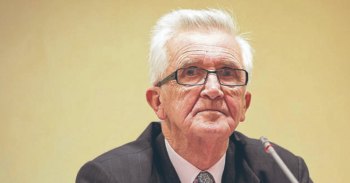 Humanists UK is saddened to hear of the death of its patron Tristan Garel-Jones, a former MP and peer who served for many years as Vice-Chair of the All-Party Parliamentary Humanist Group.
Humanists UK is saddened to hear of the death of its patron Tristan Garel-Jones, a former MP and peer who served for many years as Vice-Chair of the All-Party Parliamentary Humanist Group.
Tristan Garel-Jones was born in 1941 and educated at King’s School Canterbury. First elected in 1979, Lord Garel-Jones had a distinguished career in politics as Conservative MP for Watford until 1997 and held a range of high-profile posts during this time including Foreign and Commonwealth Minister and Government Whip, reflecting his renowned skill and wit as a politician.
As an effective government whip in Thatcher’s government, Tristan is said to have been the inspiration for the iconic character of Francis Urquhart, the lead in Michael Dobbs’ novel House of Cards and its sequels and various television adaptations. But where Dobbs’ character was a cold, machiavellian schemer, Garel-Jones was in reality a warm and enthusiastic person who cared deeply about human rights, equality, and the advancement of humanist ideals.
He was, in all cases, a consummate politician and someone who inspired the respect and loyalty of his colleagues. When he stood down as an MP in 1997, he was made a new life peer in the following Parliament and created Lord Garel-Jones of Watford. Freed of his government responsibilities, he was able to let his passions and convictions come to the fore of his political life – chief among them his passion for humanism.
For many years, Tristan was the elected Vice Chair of the All-Party Parliamentary Humanist Group, being re-elected in that role as recently as February 2020. It was a position he took seriously and committedly, using his place in the Lords to field parliamentary questions on issues like faith school admissions and to call consistently for the legal recognition of humanist marriages, which had become his biggest parliamentary cause in recent years.
Campaigning on humanist issues was more than just a hobby to Tristan – humanism was a motivating force in his life, particularly in his later years. In recent years, he put his name to letters to the BBC calling for the equal treatment of humanists from programmes like Thought for the Day, and lobbied the Foreign and Commonwealth Office on behalf of Gulalai Ismail and other humanists like her who faced persecution for their beliefs in Pakistan and elsewhere.
Apart from his passion for humanism and the ideals of the Enlightenment, Tristan was also a devoted lover of Spain and Spanish culture. It was while living there that he first met his wife Catalina Garrigues Carnicer, whom he married in 1966 and with whom he had five children. As a testament to his chivalric and romantic qualities as much as his commitment to freedom of religion or belief, he built a chapel for Catalina on his estate so she could practice her religion in a comfortable religious setting, despite his own strong humanist convictions. He built a bench outside it so that he could smoke and contemplate more worldly concerns at the same time.
Humanists UK Chief Executive Andrew Copson commented:
‘Tristan was a loyal friend to the humanist movement for many years and we at Humanists UK felt fortunate to count him a personal friend too. His contemporaries in both Houses knew him as a consummate politician.
‘As an active humanist, he combined acuity, wit, and kindness to not just pursue the causes humanists care about but to do so in the rational and empathetic mode that humanists value. His most recent cause was legal recognition of humanist marriages – a reform which it is sad he did not see before the end. We are all grateful for his support and to have known him.’
Chair of the APPHG Crispin Blunt MP said:
‘I had no idea when I invited Tristan to preside over my re-election as Chair of the All-Party Parliamentary Humanist Group last month it would be the last time he would be present to support us. Conservative voices have been too few, but Tristan was one of the finest. Decent, intellectual, and rational his analysis of any situation commanded attention on merit. I will much miss him, he was present down the “green” end of Parliament to the end taking the temperature. I will try and follow his fine example and I’m very proud to have had him as a Conservative humanist colleague.’
NOTES:
Read his obituary in The Telegraph.
Read his obituary in The Times.
Humanists UK is the national charity working on behalf of non-religious people. Powered by over 100,000 members and supporters, we advance free thinking and promote humanism to create a tolerant society where rational thinking and kindness prevail. We provide ceremonies, pastoral care, education, and support services benefitting over a million people every year and our campaigns advance humanist thinking on ethical issues, human rights, and equal treatment for all.
Humanists UK has over 170 patrons who support its work in various ways through their expertise and prominence in various fields. Existing patrons include significant figures from the spheres of science, philosophy, human rights activism, politics, the arts, and broadcasting. Alongside its patrons, Humanists UK has a President and a number of Vice Presidents. From January 2019, its President has been scientist and broadcaster Professor Alice Roberts, supported by Vice Presidents Professor Jim Al-Khalili, Shappi Khorsandi, Polly Toynbee, and Professor A C Grayling.
The All-Party Parliamentary Humanist Group is a cross-party group of Members of the House of Commons and the House of Lords of all the main parties, including members from the Crossbenches in the Lords. The Group has grown rapidly, from its first beginnings in the 1960s and now has over 110. The Group is not part of Humanists UK, but Humanists UK provides the secretariat for the Group.
